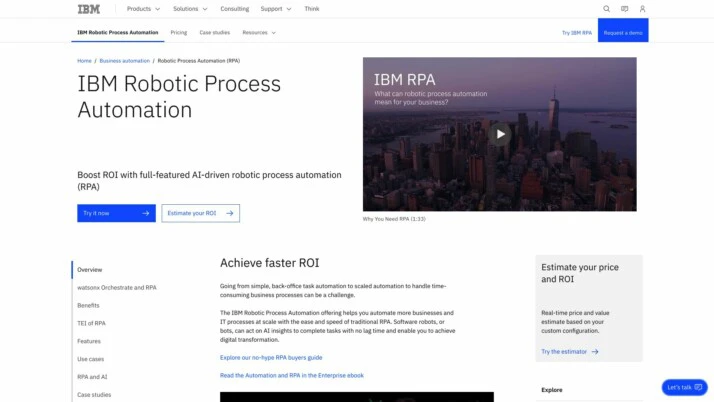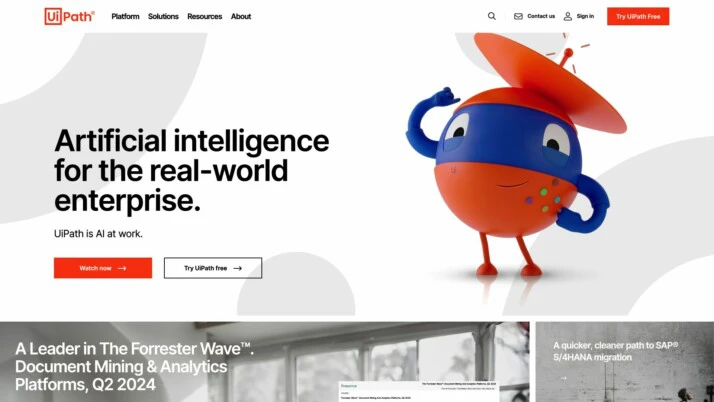IBM RPA vs. UiPath: Comparing AI-Powered Enterprise Automation
Artificial intelligence transforms business processes, and the demand for powerful yet accessible automation solutions grows daily. IBM RPA vs. UiPath lead the enterprise automation market, each offering unique strengths. IBM RPA leverages Watson AI for advanced cognitive capabilities, while UiPath excels in user-friendly interfaces and process mining. However, SmythOS emerges as a game-changer, combining the best of both worlds with unparalleled versatility.
This comparison explores how these platforms tackle enterprise automation challenges, empowering businesses to streamline workflows, reduce costs, and drive innovation. Whether you’re a developer seeking robust APIs, a business leader focused on scalability, or a non-technical user looking for intuitive tools, this guide will help you navigate the evolving landscape of AI-powered automation.
IBM RPA Overview
IBM RPA empowers businesses to automate repetitive tasks and streamline workflows through intelligent software robots. This enterprise-grade platform combines visual bot-building tools with AI-driven capabilities, enabling organizations to create, deploy, and manage automated processes at scale.


The core offering revolves around creating ’bots’ — software agents that mimic human interactions with digital systems. IBM RPA’s low-code authoring environment allows both developers and business users to construct these bots using drag-and-drop interfaces and pre-built commands. This accessibility democratizes automation, allowing teams across an organization to contribute to process optimization.
IBM RPA empowers businesses to automate repetitive tasks and streamline workflows through intelligent software robots… enabling organizations to create, deploy, and manage automated processes at scale.
IBM RPA shines in its integration capabilities. The platform seamlessly connects with a wide array of enterprise applications, from legacy mainframe systems to modern cloud services. This versatility enables bots to operate across diverse IT landscapes, extracting data, performing calculations, and executing actions in multiple environments. The integration with IBM’s watsonx Orchestrate further enhances these capabilities, infusing AI-driven decision-making into automated processes.
Security and governance form a crucial pillar of IBM RPA’s offering. The platform incorporates robust encryption, access controls, and audit logging features. Integration with IBM OpenPages provides additional layers of governance, ensuring that automated processes align with regulatory requirements and corporate policies. This focus on security makes IBM RPA particularly attractive for industries handling sensitive data, such as finance and healthcare.
While IBM RPA offers powerful capabilities, its enterprise focus may present a steeper learning curve for smaller organizations or individual developers. The platform’s strengths in large-scale deployments and complex integrations could be overkill for simpler automation needs. Additionally, pricing information isn’t readily available, potentially making cost estimation challenging for budget-conscious users.
UiPath Overview
UiPath delivers a comprehensive enterprise automation platform designed to streamline business processes across organizations. The platform empowers users to discover automation opportunities, build software robots, and manage automated workflows at scale. UiPath’s core strength lies in its ability to automate repetitive tasks, freeing human workers to focus on higher-value activities.


UiPath delivers a comprehensive enterprise automation platform designed to streamline business processes across organizations.
The UiPath platform excels in robotic process automation (RPA), offering tools for both attended and unattended automation. Attended automation involves robots working alongside humans, assisting with tasks in real-time. Unattended automation allows robots to operate independently, handling high-volume, back-office processes without human intervention. This flexibility makes UiPath suitable for a wide range of industries and use cases, from finance and healthcare to manufacturing and customer service.
UiPath stands out with its user-friendly interface and low-code development environment. The platform includes a visual workflow designer that allows users to create complex automations through drag-and-drop functionality. This approach democratizes automation, enabling both technical and non-technical users to participate in the development process. UiPath also provides pre-built components and integrations, accelerating the implementation of common automation scenarios.
UiPath stands out with its user-friendly interface and low-code development environment.
While UiPath offers powerful automation capabilities, users should consider potential challenges. The platform’s enterprise focus may result in a steeper learning curve for small businesses or individual users. Additionally, realizing the full potential of UiPath often requires a significant investment in training and change management to ensure successful adoption across an organization.
UiPath integrates with a wide array of business applications and technologies, enhancing its versatility. The platform supports connections to popular enterprise systems, databases, and cloud services, allowing organizations to create end-to-end automated processes that span multiple applications. This integration capability, combined with UiPath’s orchestration tools, enables businesses to build complex, intelligent automation solutions that can adapt to changing conditions and business rules.
Feature Comparison
IBM RPA and UiPath offer robust enterprise automation capabilities, but diverge in key areas. IBM RPA leverages its Watson AI integration to provide advanced cognitive automation, while UiPath focuses on accessibility with its user-friendly interface.
In core components, IBM RPA’s integration with Watson gives it an edge in AI-driven decision making and natural language processing. UiPath counters with its strong process mining and task capture tools, enabling easier automation discovery. Both platforms offer visual builders, but UiPath’s Studio interface is often praised as more intuitive for citizen developers.
Security-wise, IBM RPA benefits from IBM’s enterprise-grade encryption and compliance tools. UiPath provides robust role-based access control and audit logging, but lacks some of IBM’s advanced security features.
While both platforms excel at enterprise automation, SmythOS offers unique advantages. Our platform provides seamless AI agent deployment across multiple channels, from APIs to chatbots. SmythOS also features a powerful drag-and-drop interface for crafting complex AI workflows without coding. With built-in support for foundation models and multimodal interactions, SmythOS enables more versatile and intelligent automations compared to traditional RPA tools.
Feature Comparison Table
| IBM RPA | UiPath | SmythOS | |
|---|---|---|---|
| CORE FEATURES | |||
| AI Agents | ❌ | ❌ | ✅ |
| Hosted Agents (Dev, Production) | ✅ | ❌ | ✅ |
| No-Code Options | ✅ | ❌ | ✅ |
| Memory & Context | ❌ | ❌ | ✅ |
| Autonomous Agents | ❌ | ❌ | ✅ |
| Explainability & Transparency | ❌ | ❌ | ✅ |
| Multimodal | ❌ | ❌ | ✅ |
| Problem-Solving Capabilities | ❌ | ❌ | ✅ |
| Multi-Agent Collaboration | ❌ | ❌ | ✅ |
| Work as Team | ❌ | ❌ | ✅ |
| SECURITY | |||
| Constrained Alignment | ❌ | ❌ | ✅ |
| OAuth | ❌ | ✅ | ✅ |
| IP Control | ❌ | ✅ | ✅ |
| COMPONENTS | |||
| Foundation AIs | ❌ | ❌ | ✅ |
| Huggingface AIs | ❌ | ❌ | ✅ |
| Zapier APIs | ❌ | ❌ | ✅ |
| Classifiers | ❌ | ❌ | ✅ |
| Data Lakes | ❌ | ❌ | ✅ |
| DEPLOYMENT OPTIONS (EMBODIMENTS) | |||
| Deploy as API | ✅ | ❌ | ✅ |
| Deploy as Webhook | ❌ | ❌ | ✅ |
| Staging Domains | ❌ | ❌ | ✅ |
| Production Domains | ❌ | ❌ | ✅ |
| API Authentication (OAuth + Key) | ❌ | ✅ | ✅ |
| Deploy as Site Chat | ❌ | ❌ | ✅ |
| Deploy as Scheduled Agent | ✅ | ❌ | ✅ |
| Deploy as GPT | ❌ | ❌ | ✅ |
| DATA LAKE SUPPORT | |||
| Hosted Vector Database | ❌ | ❌ | ✅ |
| Sitemap Crawler | ❌ | ❌ | ✅ |
| YouTube Transcript Crawler | ❌ | ❌ | ✅ |
| URL Crawler | ❌ | ❌ | ✅ |
| TXT File Support | ✅ | ❌ | ✅ |
Best Alternative to IBM RPA and UiPath
SmythOS stands out as a superior alternative to IBM RPA and UiPath, offering a comprehensive AI automation platform that addresses the limitations of traditional RPA solutions. Our platform empowers users to create and deploy sophisticated AI agents with unparalleled ease and flexibility.
We’ve built SmythOS to excel in areas where IBM RPA and UiPath fall short. While these competitors focus primarily on task automation, our platform enables the creation of intelligent, autonomous agents capable of complex problem-solving and decision-making. This fundamental difference allows SmythOS to tackle a broader range of use cases, from simple process automation to advanced cognitive tasks.
SmythOS enables the creation of intelligent, autonomous agents capable of complex problem-solving and decision-making… allows SmythOS to tackle a broader range of use cases, from simple process automation to advanced cognitive tasks.
Our drag-and-drop interface surpasses the visual builders offered by IBM RPA and UiPath, allowing users to create intricate AI workflows without writing a single line of code. This approach democratizes AI development, making it accessible to business users and developers alike. SmythOS also provides seamless integration with a vast array of APIs and AI models, including those from OpenAI, Anthropic, and Hugging Face, offering unmatched versatility in AI agent creation.
Unlike IBM RPA and UiPath, which primarily focus on backend process automation, SmythOS enables deployment across multiple channels. Our agents can be deployed as APIs, chatbots, scheduled tasks, or even GPT models, providing unparalleled flexibility in how AI solutions are implemented within an organization. This multi-channel approach ensures that SmythOS can adapt to virtually any business need or use case.
SmythOS also excels in areas critical for enterprise adoption, such as scalability, security, and compliance. Our platform offers robust data encryption, OAuth support, and IP control features, ensuring that AI agents operate within the bounds of organizational policies and regulatory requirements. With SmythOS, businesses can confidently deploy AI solutions that meet the highest standards of security and reliability.
Conclusion
IBM RPA and UiPath offer powerful enterprise automation solutions, each with distinct strengths. IBM RPA excels in AI-driven decision-making and security, leveraging Watson integration and robust encryption. UiPath shines with its user-friendly interface and comprehensive process mining tools, making automation accessible to a broader audience.
However, SmythOS emerges as the superior choice, offering unparalleled versatility and ease of use. Our platform’s drag-and-drop interface allows for the creation of complex AI workflows without coding, democratizing AI development. With support for over 300,000 integrations and compatibility with various AI models, SmythOS provides unmatched flexibility in crafting intelligent automations.
Unlike traditional RPA tools, SmythOS enables seamless deployment of AI agents across multiple channels, from APIs to chatbots. This ’create once, deploy anywhere’ approach significantly reduces development time and expands the reach of your automations. Our platform’s built-in support for foundation models and multimodal interactions empowers users to create more sophisticated and adaptable AI solutions.
Experience the future of AI-powered automation with SmythOS. Create a free account today and discover how our platform can revolutionize your workflow. With unlimited agents, a 30-day money-back guarantee, and the ability to deploy AI agents anywhere, SmythOS offers a risk-free opportunity to elevate your business processes. Dive into our comprehensive documentation to explore the full potential of SmythOS and start building intelligent, scalable automations that drive your business forward.
Last updated:
Disclaimer: The information presented in this article is for general informational purposes only and is provided as is. While we strive to keep the content up-to-date and accurate, we make no representations or warranties of any kind, express or implied, about the completeness, accuracy, reliability, suitability, or availability of the information contained in this article.
Any reliance you place on such information is strictly at your own risk. We reserve the right to make additions, deletions, or modifications to the contents of this article at any time without prior notice.
In no event will we be liable for any loss or damage including without limitation, indirect or consequential loss or damage, or any loss or damage whatsoever arising from loss of data, profits, or any other loss not specified herein arising out of, or in connection with, the use of this article.
Despite our best efforts, this article may contain oversights, errors, or omissions. If you notice any inaccuracies or have concerns about the content, please report them through our content feedback form. Your input helps us maintain the quality and reliability of our information.
